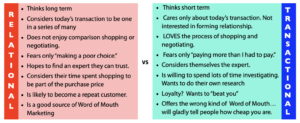Relational vs Transactional – How we interact with our patients
 I was told by a new patient at the end of our consultation “I wish I could interact with my clients more like you just did with me. You are relational, rather than transactional“. This patient worked in the financial world, where she indeed coordinates several hundreds of transactions a day, but what she was referring to was the nature of the relationship we had developed over the hour of our consultation.
I was told by a new patient at the end of our consultation “I wish I could interact with my clients more like you just did with me. You are relational, rather than transactional“. This patient worked in the financial world, where she indeed coordinates several hundreds of transactions a day, but what she was referring to was the nature of the relationship we had developed over the hour of our consultation.
I intuitively understood what she meant, since I always start by saying “we get to know our patients head to toe, inside and out” at our first visit. The vast majority of new patients we see welcome this, and love telling us about their children, spouse, work, hobbies, upcoming travel, and past surgical experiences. They appreciate the opportunity to connect with us on a personal level.
In contrast, some patients we see prefer to get down to business and don’t feel comfortable sharing personal information about their lives; they just want to be examined and get the answers to “How much?” and “What’s your availability?”. There’s no one-size-fits-all approach, and it’s important to meet patients where they’re at.
But that patient observation made me reflect… Looking into this topic further, I learned the following:
Relational connections are rooted, rewarding, and reciprocal. There is a natural give and take. They feel safe. A relational relationship is more about how it gets done. It’s about winning the hearts and minds of people. Relational engagement methods operate with a long-term view, aimed at building relationships and acknowledging the need for a stable foundation for future engagement.
Transactional connections are more self-serving. Typically, transactional approaches are short-term engagement methods aimed at getting something with minimal fuss. Transactional relationships are often temporary, can be taxing on the mind and body and are all about the short-term. Get what you want, and win the sale without much thought to the customer’s needs or the longer-term.
In simple terms, being transactional means you expect something in return for your contribution in a short time frame and if not, you will not provide your contribution. Relational means you are willing to be patient for a longer-term mutual benefit and it is okay if you don’t get the full return in the short-term.
While I imagine many Plastic Surgery practices or med-spas operate in a transactional fashion, particularly if everyone is paid on commission, San Francisco Plastic Surgery (the business name of my practice) does not! We interact relationally with our patients. I have no problem telling patients “no” or “not yet” if I think they don’t need surgery or if right now is not the best time for them to plan a major procedure. I try to recommend what is truly best for them, rather than sign them up for surgery and “win the sale”.
Similarly, patients can be relational or transactional. For transactional patients, getting the best deal is the goal, and time spent researching, comparison shopping, and negotiating are the “price” one pays to get that deal. We rarely see these types of patients, since we charge a consultation fee and our Patient Coordinator Mary Pasache describes expected fees, procedure downtime, and what to expect while visiting our office over the phone before scheduling the consultation. We rarely offer discounts, but we give every single patient 100% of our time, effort and energy to ensure they have the very best result and a rewarding experience in our office.
For relational patients (our favorite!), they appreciate and embrace the process of us getting to know them well, understanding their goals, fears, and expectations for the procedures they are looking to learn about. They understand that “you get what you pay for”. Getting the full benefit they’re after with a minimal investment of time and cognitive effort is the goal, and they accept that paying for others’ experience, expertise, and service is the “price” that buys that benefit.
I was told during my Plastic Surgery Residency training that as a surgeon, “like attracts like” and “everyone gets the practice they deserve”. I believe patients that come to see us are looking for just what we offer – surgical and non-surgical aesthetic expertise, skill and experience in a warm, inviting setting with a team that believes that every patient is a VIP and that you are worth it!. XO




